Analyzing Communication Barriers and Strategies for Travel Agency
VerifiedAdded on 2023/06/11
|6
|1960
|134
Report
AI Summary
This report examines the communication barriers faced by Barrhead Travel holidays due to the COVID-19 pandemic, which has led to declining consumer confidence. It discusses organizational communication theories such as Weber's classic organizational theory, Tompkins and Cheney’s Organizational Control Theory, and Deetz's managerialism theory, evaluating how these theories relate to the company's challenges. The report identifies physical, emotional, organizational structure, information, and cultural barriers that prevent people from booking holidays abroad. It then proposes strategies for the travel agency to overcome these barriers, including diversifying communication methods, simplifying the booking process, utilizing multiple channels and brands, and keeping customers informed and updated on the latest travel information. The report concludes that by developing clear policies and improving communication, Barrhead Travel can mitigate the negative impacts of the pandemic and restore consumer confidence.
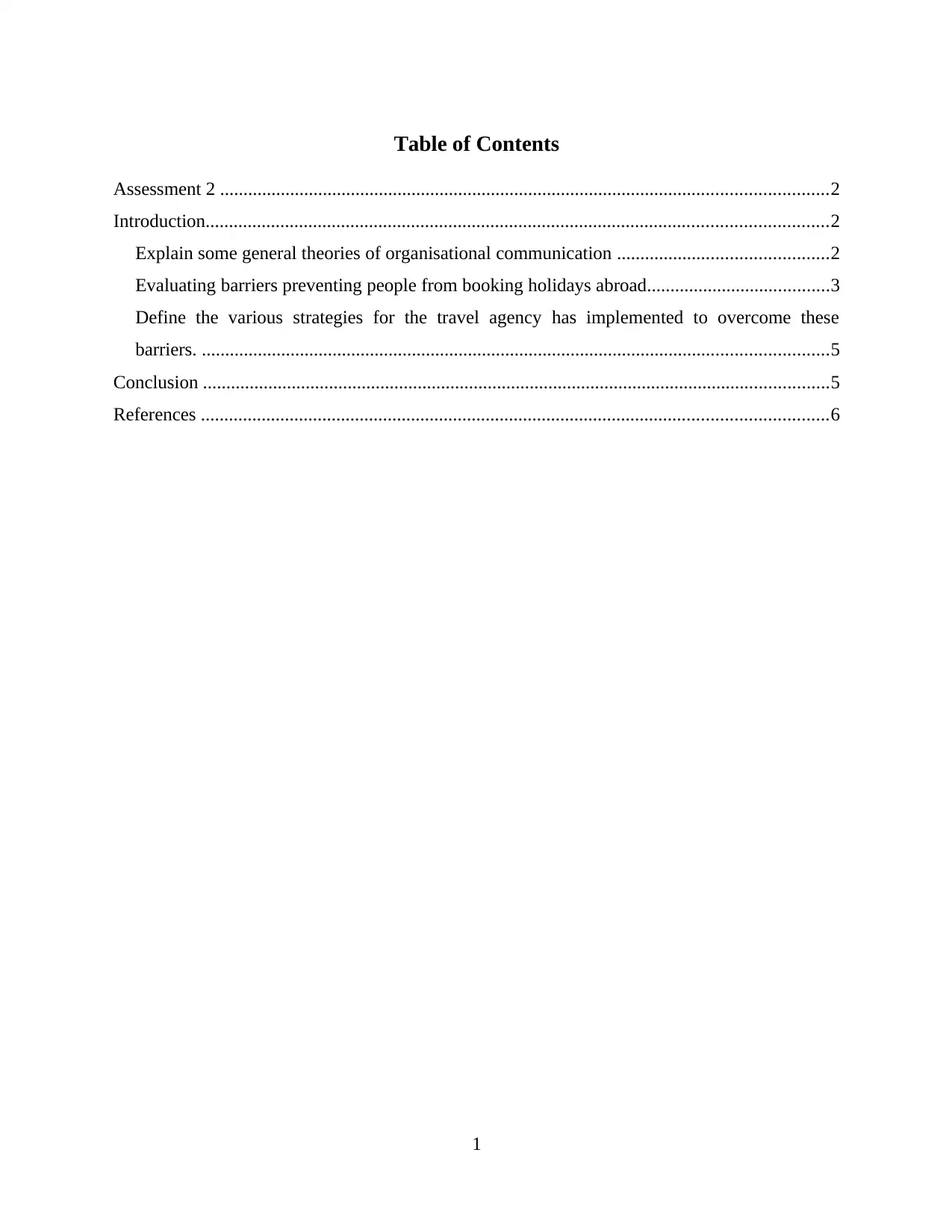
Table of Contents
Assessment 2 ..................................................................................................................................2
Introduction.....................................................................................................................................2
Explain some general theories of organisational communication .............................................2
Evaluating barriers preventing people from booking holidays abroad.......................................3
Define the various strategies for the travel agency has implemented to overcome these
barriers. ......................................................................................................................................5
Conclusion ......................................................................................................................................5
References ......................................................................................................................................6
1
Assessment 2 ..................................................................................................................................2
Introduction.....................................................................................................................................2
Explain some general theories of organisational communication .............................................2
Evaluating barriers preventing people from booking holidays abroad.......................................3
Define the various strategies for the travel agency has implemented to overcome these
barriers. ......................................................................................................................................5
Conclusion ......................................................................................................................................5
References ......................................................................................................................................6
1
Paraphrase This Document
Need a fresh take? Get an instant paraphrase of this document with our AI Paraphraser
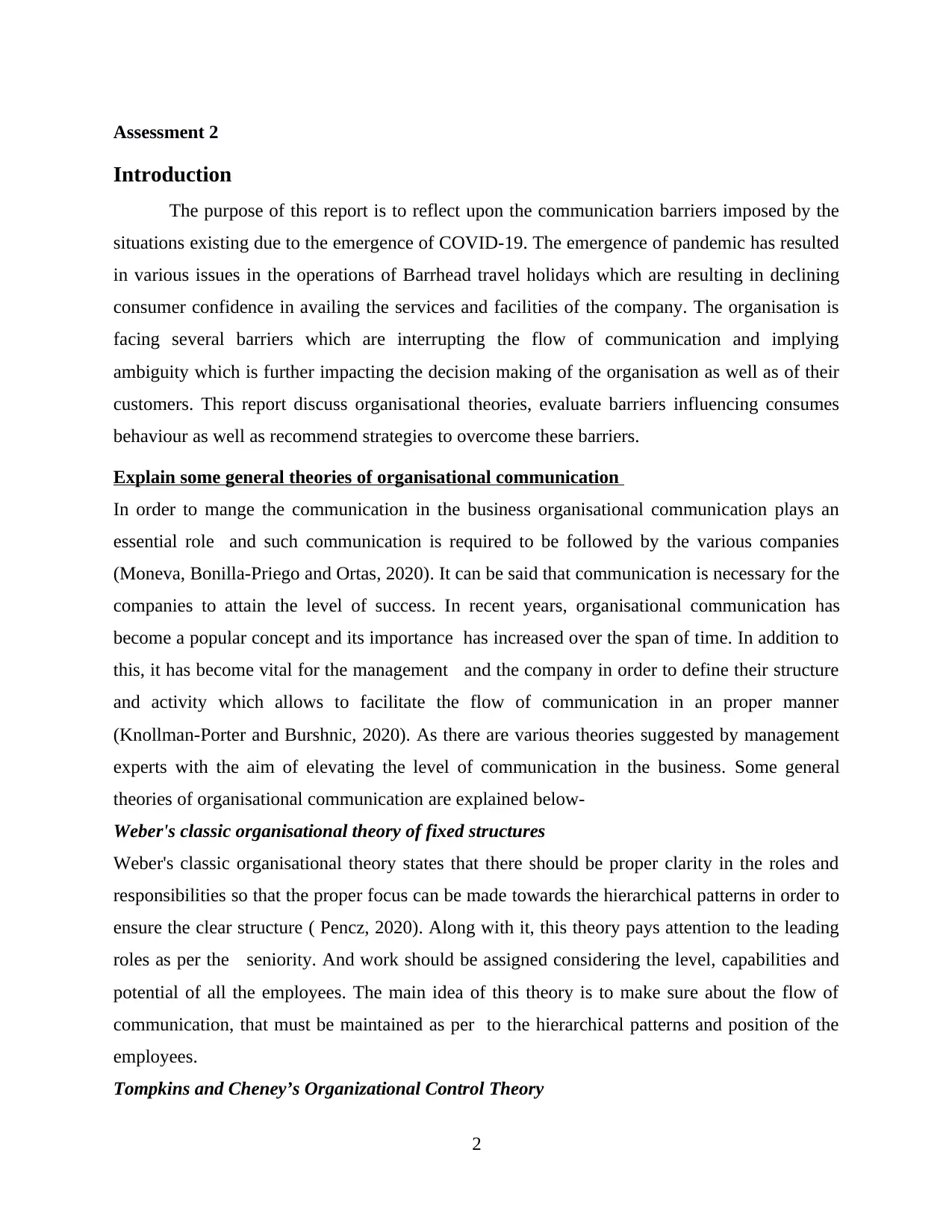
Assessment 2
Introduction
The purpose of this report is to reflect upon the communication barriers imposed by the
situations existing due to the emergence of COVID-19. The emergence of pandemic has resulted
in various issues in the operations of Barrhead travel holidays which are resulting in declining
consumer confidence in availing the services and facilities of the company. The organisation is
facing several barriers which are interrupting the flow of communication and implying
ambiguity which is further impacting the decision making of the organisation as well as of their
customers. This report discuss organisational theories, evaluate barriers influencing consumes
behaviour as well as recommend strategies to overcome these barriers.
Explain some general theories of organisational communication
In order to mange the communication in the business organisational communication plays an
essential role and such communication is required to be followed by the various companies
(Moneva, Bonilla-Priego and Ortas, 2020). It can be said that communication is necessary for the
companies to attain the level of success. In recent years, organisational communication has
become a popular concept and its importance has increased over the span of time. In addition to
this, it has become vital for the management and the company in order to define their structure
and activity which allows to facilitate the flow of communication in an proper manner
(Knollman-Porter and Burshnic, 2020). As there are various theories suggested by management
experts with the aim of elevating the level of communication in the business. Some general
theories of organisational communication are explained below-
Weber's classic organisational theory of fixed structures
Weber's classic organisational theory states that there should be proper clarity in the roles and
responsibilities so that the proper focus can be made towards the hierarchical patterns in order to
ensure the clear structure ( Pencz, 2020). Along with it, this theory pays attention to the leading
roles as per the seniority. And work should be assigned considering the level, capabilities and
potential of all the employees. The main idea of this theory is to make sure about the flow of
communication, that must be maintained as per to the hierarchical patterns and position of the
employees.
Tompkins and Cheney’s Organizational Control Theory
2
Introduction
The purpose of this report is to reflect upon the communication barriers imposed by the
situations existing due to the emergence of COVID-19. The emergence of pandemic has resulted
in various issues in the operations of Barrhead travel holidays which are resulting in declining
consumer confidence in availing the services and facilities of the company. The organisation is
facing several barriers which are interrupting the flow of communication and implying
ambiguity which is further impacting the decision making of the organisation as well as of their
customers. This report discuss organisational theories, evaluate barriers influencing consumes
behaviour as well as recommend strategies to overcome these barriers.
Explain some general theories of organisational communication
In order to mange the communication in the business organisational communication plays an
essential role and such communication is required to be followed by the various companies
(Moneva, Bonilla-Priego and Ortas, 2020). It can be said that communication is necessary for the
companies to attain the level of success. In recent years, organisational communication has
become a popular concept and its importance has increased over the span of time. In addition to
this, it has become vital for the management and the company in order to define their structure
and activity which allows to facilitate the flow of communication in an proper manner
(Knollman-Porter and Burshnic, 2020). As there are various theories suggested by management
experts with the aim of elevating the level of communication in the business. Some general
theories of organisational communication are explained below-
Weber's classic organisational theory of fixed structures
Weber's classic organisational theory states that there should be proper clarity in the roles and
responsibilities so that the proper focus can be made towards the hierarchical patterns in order to
ensure the clear structure ( Pencz, 2020). Along with it, this theory pays attention to the leading
roles as per the seniority. And work should be assigned considering the level, capabilities and
potential of all the employees. The main idea of this theory is to make sure about the flow of
communication, that must be maintained as per to the hierarchical patterns and position of the
employees.
Tompkins and Cheney’s Organizational Control Theory
2
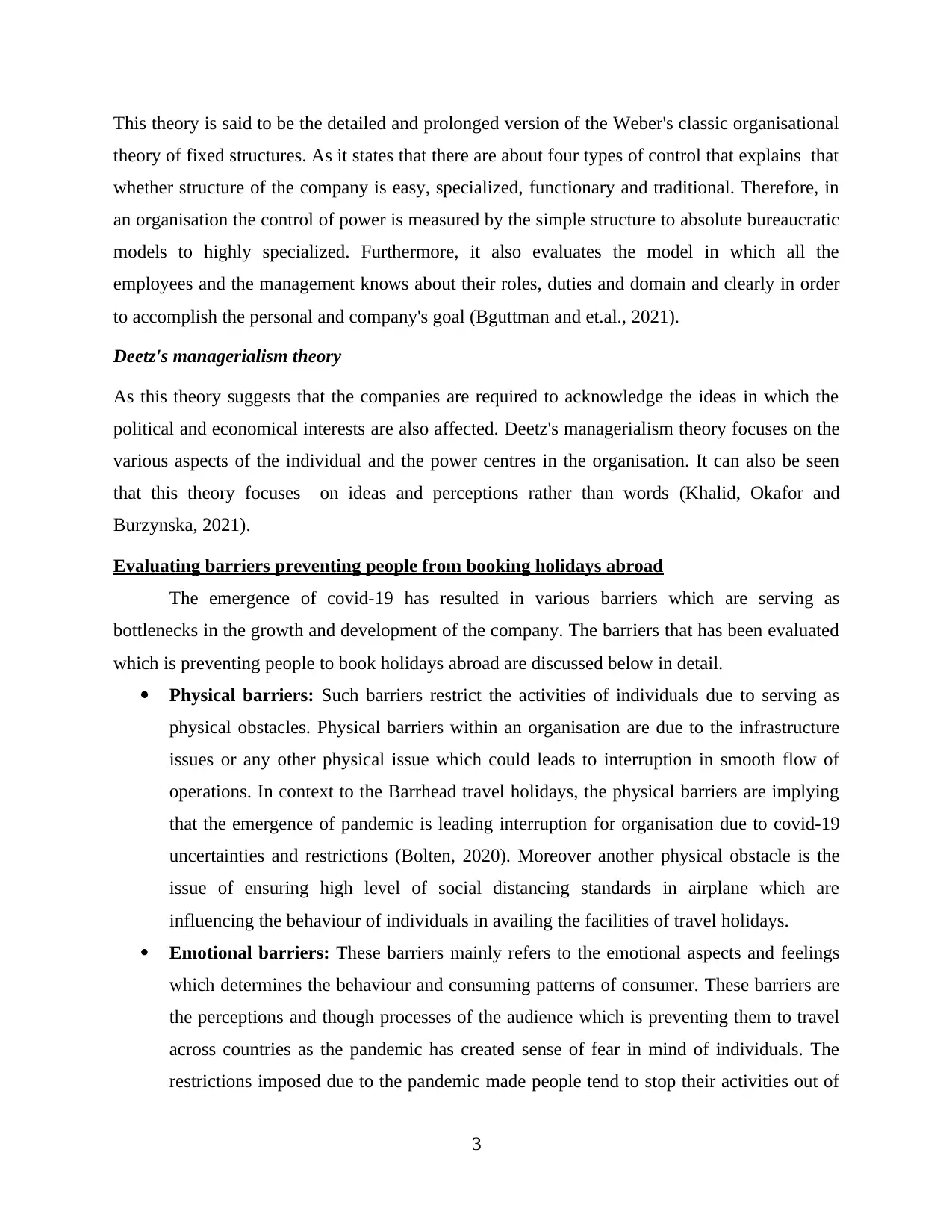
This theory is said to be the detailed and prolonged version of the Weber's classic organisational
theory of fixed structures. As it states that there are about four types of control that explains that
whether structure of the company is easy, specialized, functionary and traditional. Therefore, in
an organisation the control of power is measured by the simple structure to absolute bureaucratic
models to highly specialized. Furthermore, it also evaluates the model in which all the
employees and the management knows about their roles, duties and domain and clearly in order
to accomplish the personal and company's goal (Bguttman and et.al., 2021).
Deetz's managerialism theory
As this theory suggests that the companies are required to acknowledge the ideas in which the
political and economical interests are also affected. Deetz's managerialism theory focuses on the
various aspects of the individual and the power centres in the organisation. It can also be seen
that this theory focuses on ideas and perceptions rather than words (Khalid, Okafor and
Burzynska, 2021).
Evaluating barriers preventing people from booking holidays abroad
The emergence of covid-19 has resulted in various barriers which are serving as
bottlenecks in the growth and development of the company. The barriers that has been evaluated
which is preventing people to book holidays abroad are discussed below in detail.
Physical barriers: Such barriers restrict the activities of individuals due to serving as
physical obstacles. Physical barriers within an organisation are due to the infrastructure
issues or any other physical issue which could leads to interruption in smooth flow of
operations. In context to the Barrhead travel holidays, the physical barriers are implying
that the emergence of pandemic is leading interruption for organisation due to covid-19
uncertainties and restrictions (Bolten, 2020). Moreover another physical obstacle is the
issue of ensuring high level of social distancing standards in airplane which are
influencing the behaviour of individuals in availing the facilities of travel holidays.
Emotional barriers: These barriers mainly refers to the emotional aspects and feelings
which determines the behaviour and consuming patterns of consumer. These barriers are
the perceptions and though processes of the audience which is preventing them to travel
across countries as the pandemic has created sense of fear in mind of individuals. The
restrictions imposed due to the pandemic made people tend to stop their activities out of
3
theory of fixed structures. As it states that there are about four types of control that explains that
whether structure of the company is easy, specialized, functionary and traditional. Therefore, in
an organisation the control of power is measured by the simple structure to absolute bureaucratic
models to highly specialized. Furthermore, it also evaluates the model in which all the
employees and the management knows about their roles, duties and domain and clearly in order
to accomplish the personal and company's goal (Bguttman and et.al., 2021).
Deetz's managerialism theory
As this theory suggests that the companies are required to acknowledge the ideas in which the
political and economical interests are also affected. Deetz's managerialism theory focuses on the
various aspects of the individual and the power centres in the organisation. It can also be seen
that this theory focuses on ideas and perceptions rather than words (Khalid, Okafor and
Burzynska, 2021).
Evaluating barriers preventing people from booking holidays abroad
The emergence of covid-19 has resulted in various barriers which are serving as
bottlenecks in the growth and development of the company. The barriers that has been evaluated
which is preventing people to book holidays abroad are discussed below in detail.
Physical barriers: Such barriers restrict the activities of individuals due to serving as
physical obstacles. Physical barriers within an organisation are due to the infrastructure
issues or any other physical issue which could leads to interruption in smooth flow of
operations. In context to the Barrhead travel holidays, the physical barriers are implying
that the emergence of pandemic is leading interruption for organisation due to covid-19
uncertainties and restrictions (Bolten, 2020). Moreover another physical obstacle is the
issue of ensuring high level of social distancing standards in airplane which are
influencing the behaviour of individuals in availing the facilities of travel holidays.
Emotional barriers: These barriers mainly refers to the emotional aspects and feelings
which determines the behaviour and consuming patterns of consumer. These barriers are
the perceptions and though processes of the audience which is preventing them to travel
across countries as the pandemic has created sense of fear in mind of individuals. The
restrictions imposed due to the pandemic made people tend to stop their activities out of
3
⊘ This is a preview!⊘
Do you want full access?
Subscribe today to unlock all pages.

Trusted by 1+ million students worldwide
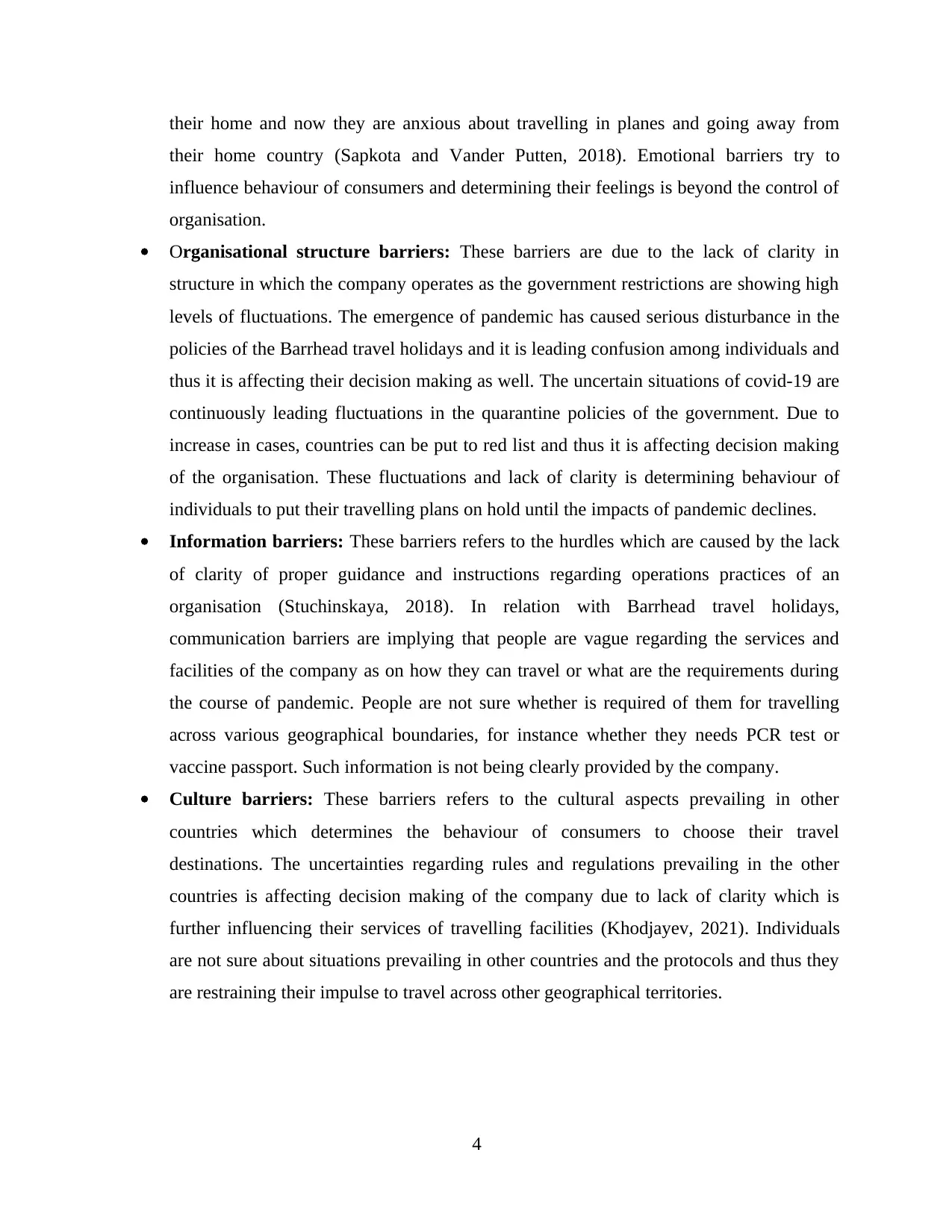
their home and now they are anxious about travelling in planes and going away from
their home country (Sapkota and Vander Putten, 2018). Emotional barriers try to
influence behaviour of consumers and determining their feelings is beyond the control of
organisation.
Organisational structure barriers: These barriers are due to the lack of clarity in
structure in which the company operates as the government restrictions are showing high
levels of fluctuations. The emergence of pandemic has caused serious disturbance in the
policies of the Barrhead travel holidays and it is leading confusion among individuals and
thus it is affecting their decision making as well. The uncertain situations of covid-19 are
continuously leading fluctuations in the quarantine policies of the government. Due to
increase in cases, countries can be put to red list and thus it is affecting decision making
of the organisation. These fluctuations and lack of clarity is determining behaviour of
individuals to put their travelling plans on hold until the impacts of pandemic declines.
Information barriers: These barriers refers to the hurdles which are caused by the lack
of clarity of proper guidance and instructions regarding operations practices of an
organisation (Stuchinskaya, 2018). In relation with Barrhead travel holidays,
communication barriers are implying that people are vague regarding the services and
facilities of the company as on how they can travel or what are the requirements during
the course of pandemic. People are not sure whether is required of them for travelling
across various geographical boundaries, for instance whether they needs PCR test or
vaccine passport. Such information is not being clearly provided by the company.
Culture barriers: These barriers refers to the cultural aspects prevailing in other
countries which determines the behaviour of consumers to choose their travel
destinations. The uncertainties regarding rules and regulations prevailing in the other
countries is affecting decision making of the company due to lack of clarity which is
further influencing their services of travelling facilities (Khodjayev, 2021). Individuals
are not sure about situations prevailing in other countries and the protocols and thus they
are restraining their impulse to travel across other geographical territories.
4
their home country (Sapkota and Vander Putten, 2018). Emotional barriers try to
influence behaviour of consumers and determining their feelings is beyond the control of
organisation.
Organisational structure barriers: These barriers are due to the lack of clarity in
structure in which the company operates as the government restrictions are showing high
levels of fluctuations. The emergence of pandemic has caused serious disturbance in the
policies of the Barrhead travel holidays and it is leading confusion among individuals and
thus it is affecting their decision making as well. The uncertain situations of covid-19 are
continuously leading fluctuations in the quarantine policies of the government. Due to
increase in cases, countries can be put to red list and thus it is affecting decision making
of the organisation. These fluctuations and lack of clarity is determining behaviour of
individuals to put their travelling plans on hold until the impacts of pandemic declines.
Information barriers: These barriers refers to the hurdles which are caused by the lack
of clarity of proper guidance and instructions regarding operations practices of an
organisation (Stuchinskaya, 2018). In relation with Barrhead travel holidays,
communication barriers are implying that people are vague regarding the services and
facilities of the company as on how they can travel or what are the requirements during
the course of pandemic. People are not sure whether is required of them for travelling
across various geographical boundaries, for instance whether they needs PCR test or
vaccine passport. Such information is not being clearly provided by the company.
Culture barriers: These barriers refers to the cultural aspects prevailing in other
countries which determines the behaviour of consumers to choose their travel
destinations. The uncertainties regarding rules and regulations prevailing in the other
countries is affecting decision making of the company due to lack of clarity which is
further influencing their services of travelling facilities (Khodjayev, 2021). Individuals
are not sure about situations prevailing in other countries and the protocols and thus they
are restraining their impulse to travel across other geographical territories.
4
Paraphrase This Document
Need a fresh take? Get an instant paraphrase of this document with our AI Paraphraser
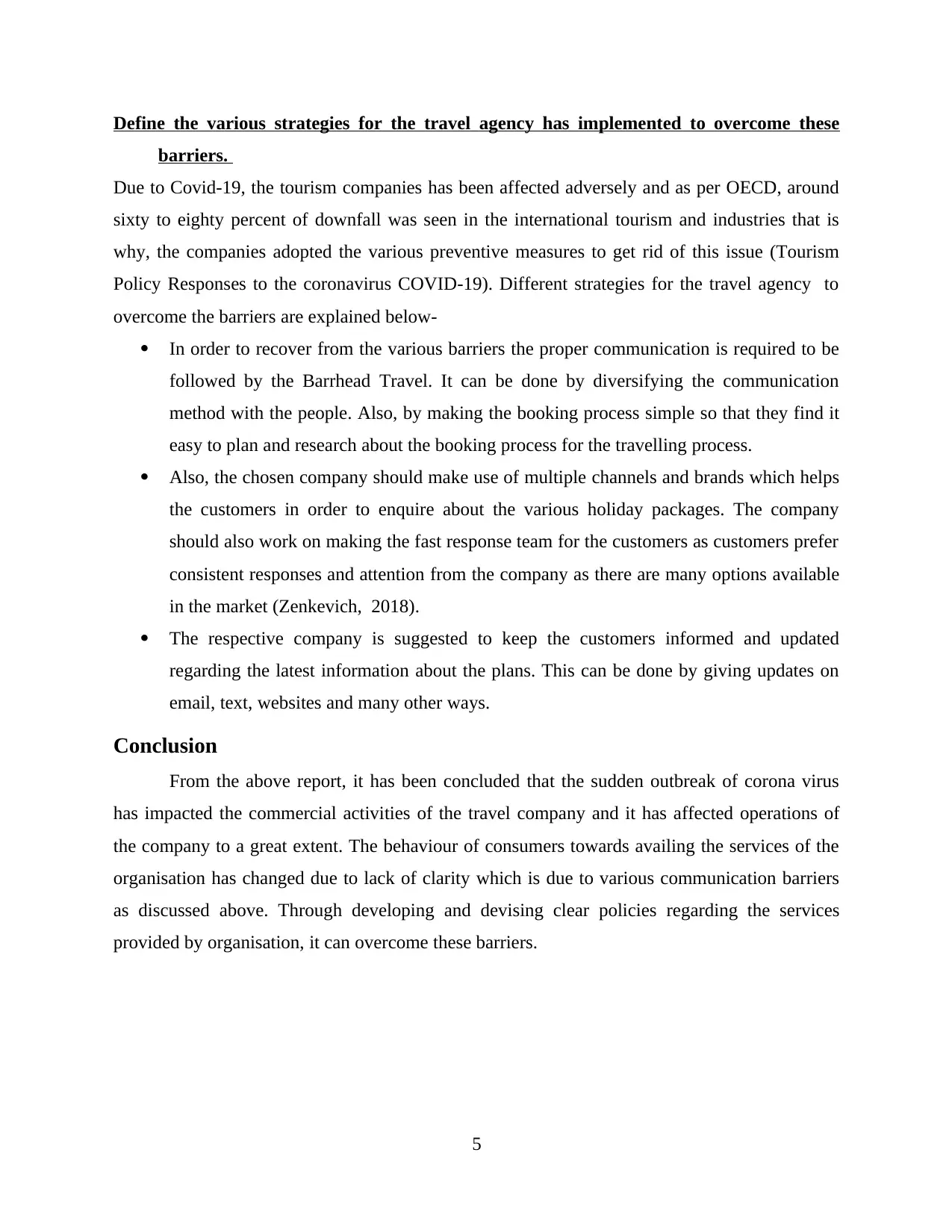
Define the various strategies for the travel agency has implemented to overcome these
barriers.
Due to Covid-19, the tourism companies has been affected adversely and as per OECD, around
sixty to eighty percent of downfall was seen in the international tourism and industries that is
why, the companies adopted the various preventive measures to get rid of this issue (Tourism
Policy Responses to the coronavirus COVID-19). Different strategies for the travel agency to
overcome the barriers are explained below-
In order to recover from the various barriers the proper communication is required to be
followed by the Barrhead Travel. It can be done by diversifying the communication
method with the people. Also, by making the booking process simple so that they find it
easy to plan and research about the booking process for the travelling process.
Also, the chosen company should make use of multiple channels and brands which helps
the customers in order to enquire about the various holiday packages. The company
should also work on making the fast response team for the customers as customers prefer
consistent responses and attention from the company as there are many options available
in the market (Zenkevich, 2018).
The respective company is suggested to keep the customers informed and updated
regarding the latest information about the plans. This can be done by giving updates on
email, text, websites and many other ways.
Conclusion
From the above report, it has been concluded that the sudden outbreak of corona virus
has impacted the commercial activities of the travel company and it has affected operations of
the company to a great extent. The behaviour of consumers towards availing the services of the
organisation has changed due to lack of clarity which is due to various communication barriers
as discussed above. Through developing and devising clear policies regarding the services
provided by organisation, it can overcome these barriers.
5
barriers.
Due to Covid-19, the tourism companies has been affected adversely and as per OECD, around
sixty to eighty percent of downfall was seen in the international tourism and industries that is
why, the companies adopted the various preventive measures to get rid of this issue (Tourism
Policy Responses to the coronavirus COVID-19). Different strategies for the travel agency to
overcome the barriers are explained below-
In order to recover from the various barriers the proper communication is required to be
followed by the Barrhead Travel. It can be done by diversifying the communication
method with the people. Also, by making the booking process simple so that they find it
easy to plan and research about the booking process for the travelling process.
Also, the chosen company should make use of multiple channels and brands which helps
the customers in order to enquire about the various holiday packages. The company
should also work on making the fast response team for the customers as customers prefer
consistent responses and attention from the company as there are many options available
in the market (Zenkevich, 2018).
The respective company is suggested to keep the customers informed and updated
regarding the latest information about the plans. This can be done by giving updates on
email, text, websites and many other ways.
Conclusion
From the above report, it has been concluded that the sudden outbreak of corona virus
has impacted the commercial activities of the travel company and it has affected operations of
the company to a great extent. The behaviour of consumers towards availing the services of the
organisation has changed due to lack of clarity which is due to various communication barriers
as discussed above. Through developing and devising clear policies regarding the services
provided by organisation, it can overcome these barriers.
5
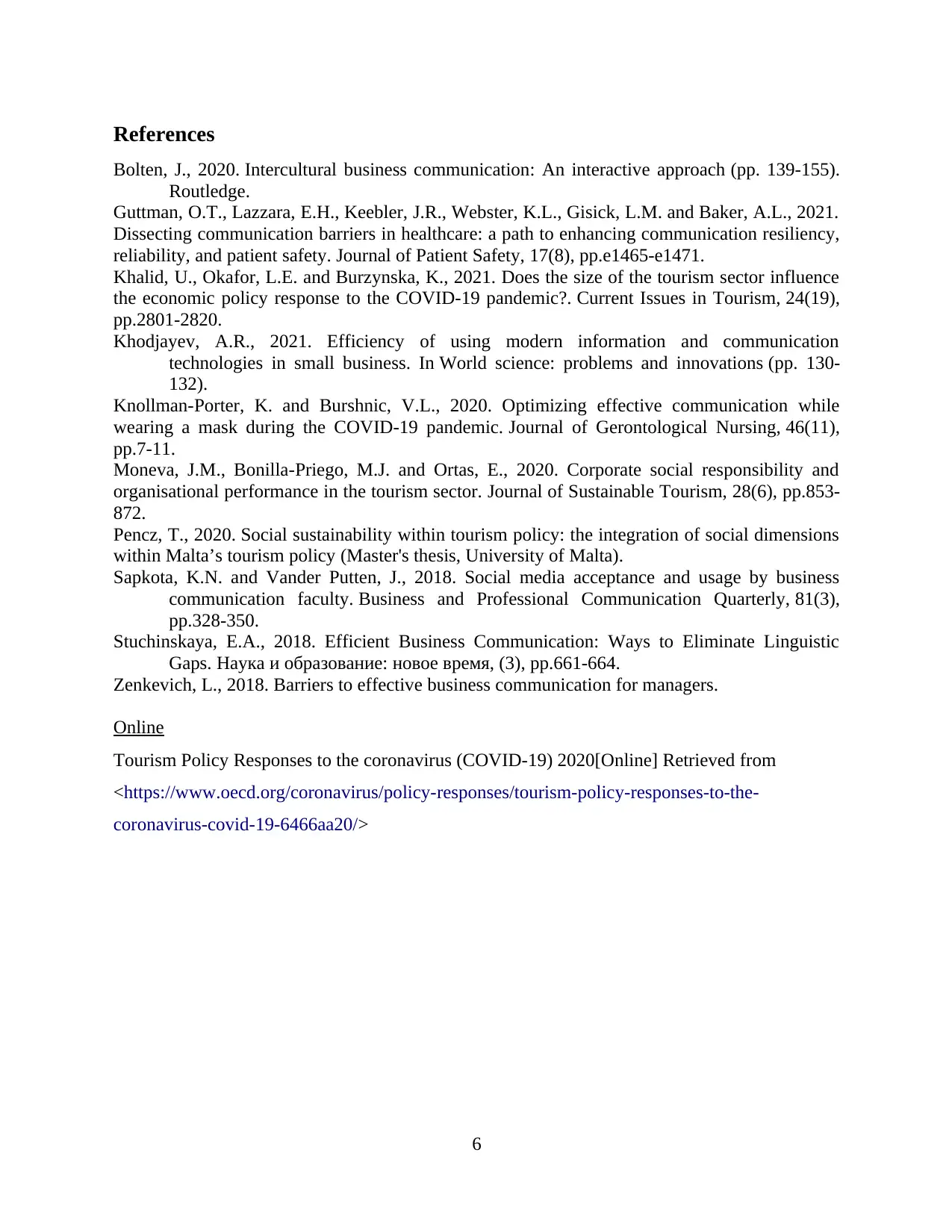
References
Bolten, J., 2020. Intercultural business communication: An interactive approach (pp. 139-155).
Routledge.
Guttman, O.T., Lazzara, E.H., Keebler, J.R., Webster, K.L., Gisick, L.M. and Baker, A.L., 2021.
Dissecting communication barriers in healthcare: a path to enhancing communication resiliency,
reliability, and patient safety. Journal of Patient Safety, 17(8), pp.e1465-e1471.
Khalid, U., Okafor, L.E. and Burzynska, K., 2021. Does the size of the tourism sector influence
the economic policy response to the COVID-19 pandemic?. Current Issues in Tourism, 24(19),
pp.2801-2820.
Khodjayev, A.R., 2021. Efficiency of using modern information and communication
technologies in small business. In World science: problems and innovations (pp. 130-
132).
Knollman-Porter, K. and Burshnic, V.L., 2020. Optimizing effective communication while
wearing a mask during the COVID-19 pandemic. Journal of Gerontological Nursing, 46(11),
pp.7-11.
Moneva, J.M., Bonilla-Priego, M.J. and Ortas, E., 2020. Corporate social responsibility and
organisational performance in the tourism sector. Journal of Sustainable Tourism, 28(6), pp.853-
872.
Pencz, T., 2020. Social sustainability within tourism policy: the integration of social dimensions
within Malta’s tourism policy (Master's thesis, University of Malta).
Sapkota, K.N. and Vander Putten, J., 2018. Social media acceptance and usage by business
communication faculty. Business and Professional Communication Quarterly, 81(3),
pp.328-350.
Stuchinskaya, E.A., 2018. Efficient Business Communication: Ways to Eliminate Linguistic
Gaps. Наука и образование: новое время, (3), pp.661-664.
Zenkevich, L., 2018. Barriers to effective business communication for managers.
Online
Tourism Policy Responses to the coronavirus (COVID-19) 2020[Online] Retrieved from
<https://www.oecd.org/coronavirus/policy-responses/tourism-policy-responses-to-the-
coronavirus-covid-19-6466aa20/>
6
Bolten, J., 2020. Intercultural business communication: An interactive approach (pp. 139-155).
Routledge.
Guttman, O.T., Lazzara, E.H., Keebler, J.R., Webster, K.L., Gisick, L.M. and Baker, A.L., 2021.
Dissecting communication barriers in healthcare: a path to enhancing communication resiliency,
reliability, and patient safety. Journal of Patient Safety, 17(8), pp.e1465-e1471.
Khalid, U., Okafor, L.E. and Burzynska, K., 2021. Does the size of the tourism sector influence
the economic policy response to the COVID-19 pandemic?. Current Issues in Tourism, 24(19),
pp.2801-2820.
Khodjayev, A.R., 2021. Efficiency of using modern information and communication
technologies in small business. In World science: problems and innovations (pp. 130-
132).
Knollman-Porter, K. and Burshnic, V.L., 2020. Optimizing effective communication while
wearing a mask during the COVID-19 pandemic. Journal of Gerontological Nursing, 46(11),
pp.7-11.
Moneva, J.M., Bonilla-Priego, M.J. and Ortas, E., 2020. Corporate social responsibility and
organisational performance in the tourism sector. Journal of Sustainable Tourism, 28(6), pp.853-
872.
Pencz, T., 2020. Social sustainability within tourism policy: the integration of social dimensions
within Malta’s tourism policy (Master's thesis, University of Malta).
Sapkota, K.N. and Vander Putten, J., 2018. Social media acceptance and usage by business
communication faculty. Business and Professional Communication Quarterly, 81(3),
pp.328-350.
Stuchinskaya, E.A., 2018. Efficient Business Communication: Ways to Eliminate Linguistic
Gaps. Наука и образование: новое время, (3), pp.661-664.
Zenkevich, L., 2018. Barriers to effective business communication for managers.
Online
Tourism Policy Responses to the coronavirus (COVID-19) 2020[Online] Retrieved from
<https://www.oecd.org/coronavirus/policy-responses/tourism-policy-responses-to-the-
coronavirus-covid-19-6466aa20/>
6
⊘ This is a preview!⊘
Do you want full access?
Subscribe today to unlock all pages.

Trusted by 1+ million students worldwide
1 out of 6
Related Documents
Your All-in-One AI-Powered Toolkit for Academic Success.
+13062052269
info@desklib.com
Available 24*7 on WhatsApp / Email
![[object Object]](/_next/static/media/star-bottom.7253800d.svg)
Unlock your academic potential
Copyright © 2020–2026 A2Z Services. All Rights Reserved. Developed and managed by ZUCOL.





